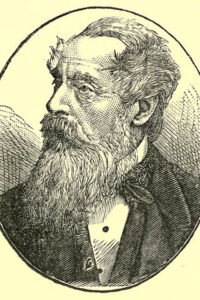
Alone on an Island
The Wolf, a letter-of-marque of twenty guns, commanded by Captain Deason, sailing from Liverpool, lay becalmed on the glass-like surface of the Pacific. The sun struck down with intense heat on the dock, compelling the crew to seek such shade as the bulwarks or sails afforded. Some were engaged in mending sails, twisting yarns, knotting, splicing, or in similar occupations; others sat in groups between the guns, talking together in low voices, or lay fast asleep out of sight in the shade. The officers listlessly paced the deck or stood leaning over the bulwarks, casting their eyes around the horizon, hoping to see signs of a coming breeze. Their countenances betrayed ill-humour and dissatisfaction; if they spoke to each other, it was gruff, moody. They had had a long course of ill luck, as they called it, having taken no prizes of value. The crew, too, had exhibited a discontented and rebellious spirit for some time, which Captain Deason, from his bad temper, was ill-fitted to quell. While he vexed and insulted the officers, they bullied and tyrannised over the men. The crew, though often quarrelling among themselves, were united in the shared hatred of their superiors till that little floating world became a perfect pandemonium.
Among those who paced her deck, anxiously looking out for a breeze, was Humphry Gurton, a fine lad of fifteen who had joined the Wolf as a midshipman. This was his first trip to sea. He had intended to enter the Navy, but just as he was about to do so, his father, a merchant at Liverpool, failed. Broken-hearted at his losses, he soon afterwards died, leaving his wife and only son scantly provided for.
Tenderly had that wife, though suffering herself from a fatal disease, watched over him in his sickness, and Humphry had often sat by his father’s bedside while his mother was reading from God’s Word and listened as with tender earnestness she explained the simple plan of salvation to his father. She had shown him from the Bible that all men are by nature sinful and incapable, by anything they can do, of making themselves fit to enter pure and holy heaven, however respectable or excellent they may be in the sight of their fellow men, and that the only way the best of human beings can come to God is by imitating the publican in the parable, and acknowledging themselves worthless, outcast sinners, and seeking to be reconciled to Him according to the one way He has appointed—through a living faith in the all-atoning sacrifice of His dear Son. Humphry had heard his father exclaim, “I believe that Jesus died for me; O Lord, help my unbelief! I have no merits of my own; I trust Him and Him alone.” He had witnessed the joy which had lighted up his mother’s countenance as she pressed his father’s hand and, bending down, whispered, “We shall be parted but for a short time; and, oh! may our loving Father grant that this our son may too be brought to love the Saviour, and join us when he is summoned to leave this world of pain and sorrow.”
Read or download Book
W. H. G. Kingston
William Henry Giles Kingston was born in Harley Street, London, on February 28, 1814. He was the eldest son of Lucy Henry Kingston (d.1852) and his wife Frances Sophia Rooke (b.1789), daughter of Sir Giles Rooke, Judge of the Court of Common Pleas. Kingston’s paternal grandfather, John Kingston (1736–1820), was a Member of Parliament who staunchly supported the Abolition of the Slave Trade despite having a plantation in Demerara.
Biography.
His father Lucy entered into the wine business in Oporto, and Kingston lived there for many years, making frequent voyages to England and developing a lifelong affection for the sea.
He was educated at Trinity College, Cambridge, and afterward entered his father’s wine business. However, he soon indulged in his natural bent for writing. His newspaper articles on Portugal were translated into Portuguese, and assisted the conclusion of the commercial treaty with Portugal in 1842, when he received from Donna Maria da Gloria an order of Portuguese knighthood and a pension.
His first book was The Circassian Chief, a story published in 1844. While living in Oporto, he wrote The Prime Minister, a historical novel based loosely on the life of Sebastião José de Carvalho e Melo, 1st Marquis of Pombal, and Lusitanian Sketches, descriptions of travels in Portugal. Settling in England, he interested himself in the emigration movement, edited The Colonist and The Colonial Magazine and East India Review in 1844, was honorary secretary of a colonization society, wrote Some Suggestions for a System of General Emigration in 1848, lectured on colonization in 1849, published a manual for colonists entitled How to Emigrate in 1850, and visited the western highlands on behalf of the emigration commissioners. He was a zealous volunteer afterward and worked actively for the improvement of the condition of seamen. But from 1850, his chief occupation was writing books for boys or editing boys’ annuals and weekly periodicals.






